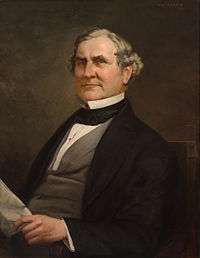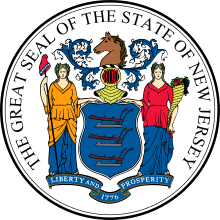William Pennington
| William Pennington | |
|---|---|
 | |
| 23rd Speaker of the United States House of Representatives | |
|
In office February 1, 1860 – March 4, 1861 | |
| President | James Buchanan |
| Preceded by | James L. Orr |
| Succeeded by | Galusha A. Grow |
| Member of U.S. House of Representatives from New Jersey's 5th district | |
|
In office March 4, 1859 – March 4, 1861 | |
| Preceded by | Jacob R. Wortendyke |
| Succeeded by | Nehemiah Perry |
| 13th Governor of New Jersey | |
|
In office October 27, 1837 – October 27, 1843 | |
| Preceded by | Philemon Dickerson |
| Succeeded by | Daniel Haines |
| Member of the New Jersey General Assembly | |
|
In office 1828 | |
| Personal details | |
| Born |
May 4, 1796 Newark, New Jersey |
| Died |
February 16, 1862 (aged 65) Newark, New Jersey |
| Political party | Republican |
| Alma mater | Princeton College |
| Profession | Law |
| Religion | Presbyterian |
William Pennington (May 4, 1796 – February 16, 1862) was an American politician and lawyer, the Governor of New Jersey from 1837 to 1843, and Speaker of the House during his one term in Congress.
Life and career
Born in Newark, New Jersey, he graduated from the College of New Jersey (now Princeton University) in 1813 and then studied law with Theodore Frelinghuysen. He was admitted to the bar in 1817 and served as a clerk of the United States District Court for the District of New Jersey (where his father was a judge) from 1817 to 1826.
As a member of the Whig party, he was elected to the New Jersey General Assembly in 1828, and then was elected Governor of New Jersey annually from 1837 to 1843. His tenure as governor was marked by the "Broad Seal War" controversy. Following a disputed election for Congressional Representatives in New Jersey, Pennington certified the election of five Whig candidates while five Democrats were certified by the Democratic Secretary of State. After a lengthy dispute, the Democrats were eventually seated.
He was appointed Governor of Minnesota Territory by President Millard Fillmore, but declined the position.
He was elected as a Republican to the 36th Congress to represent New Jersey's 5th congressional district. During his first (and only) term, he was elected Speaker of the United States House of Representatives after two months where the House was unable to reach a majority for John Sherman, the Republican candidate (the Republicans had only a plurality and the Southern Oppositionists who held the balance of power were unwilling to support either a radical Republican or a Democrat). He was an unsuccessful candidate for reelection in 1860 to the 37th Congress.
He died in Newark of an unintentional morphine overdose[1] and was interred at Mount Pleasant Cemetery in Newark.
See also
References
- United States Congress. "William Pennington (id: P000214)". Biographical Directory of the United States Congress.
- New Jersey Historical Commission biography for William Pennington
- New Jersey Governor William Pennington, National Governors Association
- William Pennington biography from The Political Graveyard
- "William Pennington". Webster's American Biographies. G. & C. Merriam Company. 1975.
| Political offices | ||
|---|---|---|
| Preceded by Philemon Dickerson |
Governor of New Jersey October 27, 1837 – October 27, 1843 |
Succeeded by Daniel Haines |
| Preceded by James L. Orr |
Speaker of the U.S. House of Representatives February 1, 1860 – March 4, 1861 |
Succeeded by Galusha A. Grow |
| United States House of Representatives | ||
| Preceded by Jacob R. Wortendyke |
Member of the U.S. House of Representatives from New Jersey's 5th congressional district March 4, 1859 – March 4, 1861 |
Succeeded by Nehemiah Perry |

